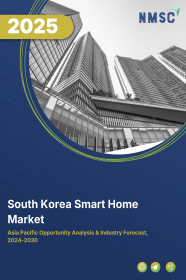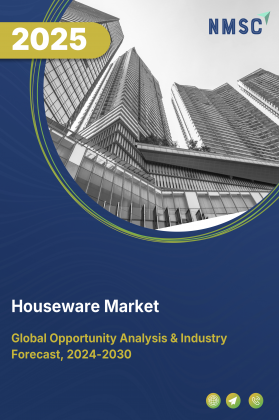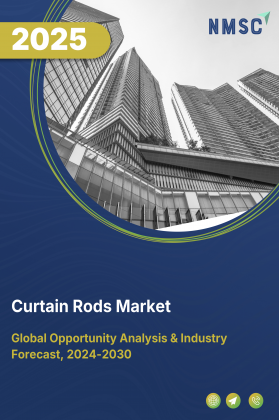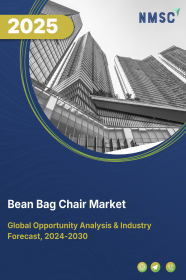
South Korea Smart Home Market by Product Type (Smart Lighting, Smart Home Security and Surveillance, Smart Entertainment, and Smart Appliances), by Communication Protocol (Wifi, Zigbee, Z-wave, Bluetooth, and Thread), by Smart Home Hubs (Standalone Hubs, and Built-in Hubs), by Voice Assistants Integration (Amazon Alexa, Goggle Assistant, Apple Siri, and Others), by Smart Home Compatibility with Smartphones (iOS, and Android), and Others – Opportunity Analysis and Industry Forecast, 2024–2030
Industry: Retail and Consumer | Publish Date: 19-May-2025 | No of Pages: 179 | No. of Tables: 139 | No. of Figures: 84 | Format: PDF | Report Code : RC2293
Market Overview
The South Korea Smart Home Market size was valued at USD 5.13 billion in 2023, and is predicted to reach USD 23.31 billion by 2030, at a CAGR of 24.1% from 2024 to 2030. A smart home, also referred to as a connected home, is a residential space equipped with cutting-edge technology and automation systems.
Connected home systems allow for the centralized control and monitoring of a wide range of household devices, appliances, and security features through a unified network. These intelligent devices can be managed remotely and often respond to voice commands or pre-set schedules, providing homeowners with enhanced convenience, energy efficiency, and security. Smart homes typically incorporate components such as smart thermostats, lighting systems, security cameras, voice assistants, and other interconnected devices, all aimed at enhancing the overall living experience.
Government Initiatives Fuelling the Growth of the Market
The proactive efforts of the South Korean government to promote smart homes through a range of incentives, policies, and initiatives serve as a significant driver for the smart home market growth in the region. These measures incentivize homeowners to embrace smart technologies, including energy-efficient appliances and home automation systems, thereby fostering more connected and efficient living environments.
A notable example is the collaboration between the Korea Information and Communication Technology Association (KOIT) and the Korea Land and Housing Company, a semi-governmental organization overseeing urban land and housing development. Together, they launched an ambitious project to establish a connected home platform using the secure IP Framework for devices.
Developed by the Open Communication Foundation, this framework provides a secure infrastructure for reliable connections between specific applications, facilitating smooth and secure operation for connected homes. Such government support creates an advantageous environment for the South Korea smart home market expansion.
Technological Advancements by Industry Leaders are Driving the Market Growth
Continuous technological innovations and advancements by key players in the South Korea smart home industry are driving the market growth. Tech giants such as Samsung and LG are at the forefront of developing cutting-edge connected home solutions.
For instance, in January 2023, Samsung introduced the "SmartThings Station," a new addition to its connected home ecosystem. This innovative product aims to elevate the connected home experience by centralizing control and connectivity. Serving as a hub for various smart devices, the SmartThings Station enables users to seamlessly manage and monitor their connected home ecosystem.
Samsung's commitment to advancing the smart home market is evident through its provision of integrated and user-friendly solutions that streamline home automation and enhance consumer convenience. These advancements in functionality, convenience, and integration attract consumers seeking modern living experiences, thereby contributing to the South Korea smart home market demand.
Security and Data Privacy Concerns Act as Barrier to the Growth of the Market
The South Korea smart home market growth faces a significant challenge due to concerns surrounding the security of interconnected systems. Smart devices such as thermostats, cameras, and door locks are susceptible to hacking, posing potential risks to residents' privacy and safety. This vulnerability often stems from weak or easily guessed passwords and inadequate Wi-Fi network security measures.
Exploiting these weaknesses, hackers can gain unauthorized access, potentially taking control of devices or accessing sensitive data. To address these risks, cautious homeowners must prioritize strict password protocols, regularly update device firmware, and strengthen their home networks to reduce the likelihood of cyber intrusions and safeguard their connected homes against potential breaches.
Integration of Blockchain Technology into Smart Home Devices Presents Lucrative Opportunity for Market Expansion
The integration of blockchain technology holds immense potential for enhancing the security and privacy of smart home systems. This is achieved by encrypting and securely storing sensitive data, enabling users to control access to their information and mitigating the risk of unauthorized intrusion.
Blockchain technology also validates device identities, ensuring that only trusted devices participate in the connected home network, and simplifies processes through tamper-proof smart contracts.
Furthermore, it decentralizes device control, thereby reducing vulnerabilities and facilitating transparent management of access control and permissions. By integrating blockchain into smart homes, not only does it strengthen security and privacy, but it also fosters a safer and more confidential environment. As a result, it is poised to create significant growth opportunities for the South Korea smart home market.
Competitive Landscape
Several market players operating in the South Korea smart home industry include Honeywell International, Inc., Schneider Electric Ltd., ABB Ltd., Samsung Electronics Co. Ltd., LG Electronics, Hitachi, Ltd., Sony Corporation, Robert Bosch GmbH, Google LLC, TP-Link Systems Inc. (Kasa), Apple Inc., Koninklijke Philips N.V., Lenovo Group Ltd., DAERYUN Industry Co., Ltd., Antela Global.
South Korea Smart Home Market Key Segments
By Product Type
-
Smart Lighting
-
Smart Bulbs
-
Smart Light Strips
-
Smart Switches
-
-
Smart Home Security and Surveillance
-
Smart Cameras
-
Video Doorbells
-
Smart Locks
-
Security System
-
-
Smart Entertainment
-
Smart TVs
-
Smart Speakers
-
Streaming Devices
-
-
Smart Appliances
-
Smart Refrigerators
-
Smart Ovens
-
Smart Washing Machines
-
Smart Dishwashers
-
Smart Home HVAC Management
-
Other Smart Appliances
-
By Communication Protocol
-
Wi-Fi
-
Zigbee
-
Z-wave
-
Bluetooth
-
Thread
By Smart Home Hubs
-
Standalone Hubs
-
Built-in Hubs
By Voice Assistants Integration
-
Amazon Alexa
-
Google Assistant
-
Apple Siri
-
Others
By Smart Home Compatibility with Smartphones
-
iOS
-
Android
By Installation
-
DIY Installation
-
Professional Installation
By Sales Channel
-
Online Retailers
-
E-commerce Platforms
-
Company Websites
-
-
Retailers
-
Retail Stores
-
Supermarkets & Hypermarkets
-
Specialty Stores
-
KEY PLAYERS
-
Honeywell International, Inc.
-
Schneider Electric Ltd.
-
ABB Ltd.
-
Samsung Electronics Co. Ltd.
-
LG Electronics
-
Hitachi, Ltd.
-
Sony Corporation
-
Robert Bosch GmbH
-
Google LLC
-
TP-Link Systems Inc. (Kasa)
-
Apple Inc.
-
Koninklijke Philips N.V.
-
Lenovo Group Ltd.
-
DAERYUN Industry Co., Ltd.
-
Antela Global
REPORT SCOPE AND SEGMENTATION:
|
Parameters |
Details |
|
Market Size in 2023 |
USD 5.13 Billion |
|
Revenue Forecast in 2030 |
USD 23.31 Billion |
|
Growth Rate |
CAGR of 24.1% from 2024 to 2030 |
|
Analysis Period |
2023–2030 |
|
Base Year Considered |
2023 |
|
Forecast Period |
2024–2030 |
|
Market Size Estimation |
Billion (USD) |
|
Growth Factors |
Government initiatives accelerating the market growth. Technological advancements by industry leaders fuels the market growth |
|
Companies Profiled |
15 |
|
Market Share |
Available for 10 companies |
|
Customization Scope |
Free customization (equivalent up to 80 working hours of analysts) after purchase. Addition or alteration to country, regional, and segment scope. |
|
Pricing and Purchase Options |
Avail customized purchase options to meet your exact research needs. |




















 Speak to Our Analyst
Speak to Our Analyst
























